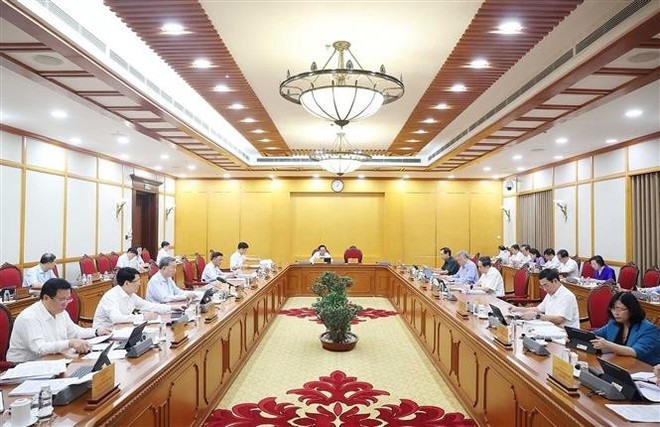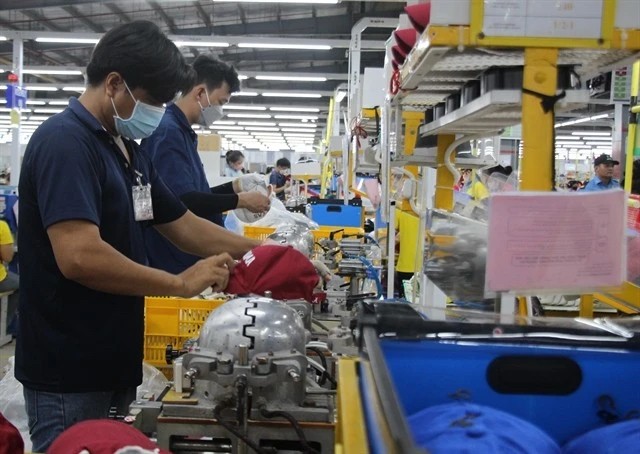Average income to reach over USD18,000 in PPP terms: Vietnam 2035 report
(VNF) - Produced jointly by the Vietnam’s Ministry of Planning and Investment, the World Bank Group, and external experts from Vietnam, the Vietnam 2035 report lays out key reforms for the lower middle income country to grow its economy, become more equitable, and put in place modern governance over the next 20 years. .jpg)
It recommends steps to help lift Vietnam to upper middle income status in two decades suggests that Vietnam build a more competitive private sector, support smart urbanization, promote innovation, and take advantage of increasing trade opportunities to enact broad structural reforms.
Reaching the ambitious goal of upper middle income status would require Vietnam to grow at least 7% per year, raising the average income level to over USD7,000 (or USD18,000 in purchasing-power parity-PPP terms) by 2035, compared with USD2,052 (or USD5,370 in PPP terms) in 2014.
“In the last 30 years, Vietnam has become one of the world’s great development success stories, rising from the ranks of the poorest countries. On the strength of a nearly 7% average growth rate and targeted Government policies, tens of millions of people have lifted themselves out of extreme poverty,” said World Bank Group President Jim Yong Kim in the launching ceremony held in Hanoi on February 23rd.
The WB President said that the Report under the theme “Toward Prosperity, Creativity, Equity, and Democracy”, reflects Vietnam’s aspirations of becoming a modern, industrialized nation within a generation.
“Improvements in productivity, environmental protection and economic innovation can help Vietnam maintain high levels of growth. It will be critically important to remove barriers that exclude marginalized groups and deliver quality public services to an aging and urbanizing middle-class,” he said.
According to the Report, Vietnam should build modern and more transparent institutions - those steps will help the country meet its ambitious goals.
The agreement to work on the joint Report was made in Hanoi between Prime Minister Nguyen Tan Dung and Mr Kim in July 2014.
“Our country is at a turning point of reform and development. We face significant opportunities, but also big challenges. To reach our goal of a becoming a prosperous, creative, equal and democratic Vietnam, our only choice is to implement the reforms recommended by the Vietnam 2035 report. Without these reforms it will be hard for us to avoid falling into the middle income trap and lagging behind. We see these reforms as a continuation of the historic Renewal reform process and we believe current and future generations of Vietnamese people have the will, determination, courage and capacity to successfully implement these changes”, said Minister of Planning and Investment, Mr Bui Quang Vinh.
There are three areas in the Report, including improving productivity and private-sector competitiveness; promoting equity and social inclusion; and improving public sector effectiveness.
Improving productivity and private sector competitiveness
Vietnam should take steps to strengthen the economy and financial sector, with a focus on more effective regulation, protection of property rights and enforcement of competition policies. New policies and investments supporting the growth of industries linked to global supply chains, along with smarter use of major international trade agreements like the Trans-Pacific Partnership are recommended. Besides, it is necessary to see improvements in agriculture sector (which employs nearly half the nation’s workforce) as well as stronger environmental protections and better planning for clean energy generation.
Promoting equity and social inclusion
By providing greater access to opportunities for minorities, people with disabilities and women, and providing services to an aging, urbanizing and middle-class society, the nation can continue fostering social inclusion and equality. Vietnam has made impressive progress on the inclusion agenda, however, ethnic minorities comprise half of the country’s poor despite being only 15 percent of its population.
Bolstering the state’s effectiveness
It recommends governance improvements to help boost accountability and transparency, and ensure Vietnam has strong institutions to keep pace with the country’s rapid development. The report suggests adopting a more unified government structure that more clearly defines the economic functions of the state, reduces its role in direct production, clarifies boundaries between the private and public sphere, and employs and promotes staff based on merit./.
( VNF )
Recommended
 National
National
Vietnam News Today (Jun. 7): Prime Minister works with Estonian firms to accelerate projects in Vietnam
 National
National
Vietnam News Today (Jun. 6): Foreign Investment in Vietnam Surges in Five Months
 National
National
Vietnam News Today (Jun. 5): PM sets off for attendance at UNOC 3 in France, official visits to Estonia, Sweden
 National
National
Vietnam News Today (Jun. 4): Vietnam - Promising Candidate for Southeast Asia’s Next Powerhouse
Popular article
 National
National
Shangri-La Dialogue 22: Vietnam Highlights Some Issues of Ensuring Stability in a Competitive World
 National
National
Vietnam News Today (Jun. 3): PM Pham Minh Chinh to Attend UN Ocean Conference, Visit Estonia, Sweden
 National
National
Vietnam News Today (Jun. 2): Vietnamese Trade Mission Sounds Out Business Opportunities in United States
 National
National



